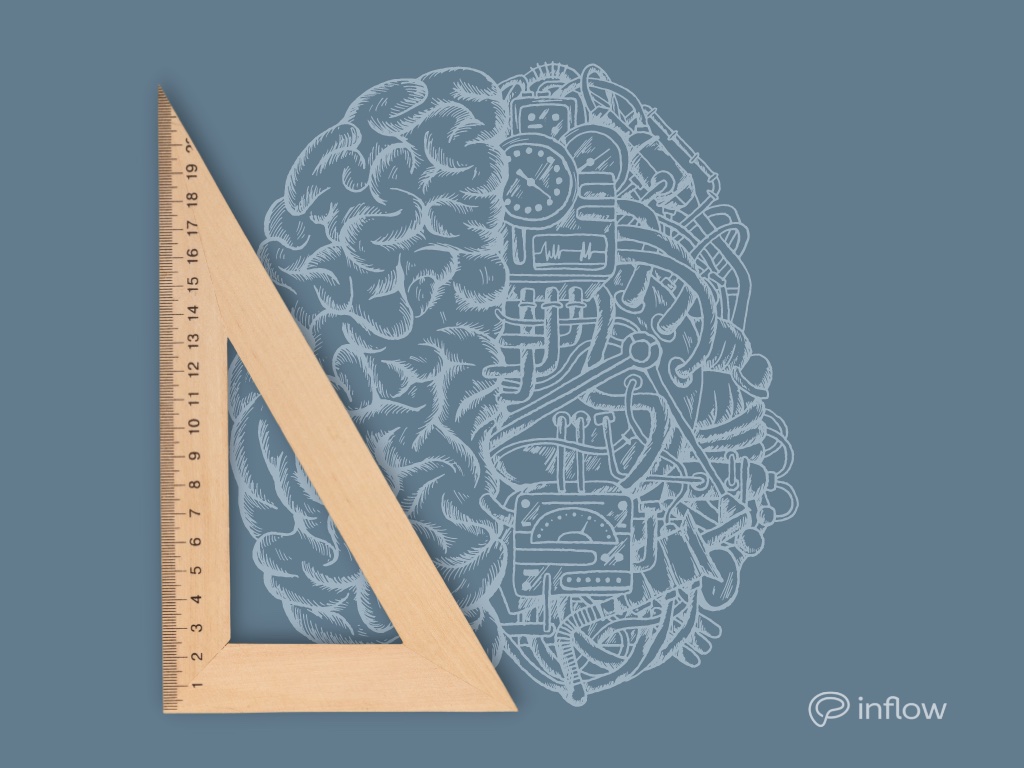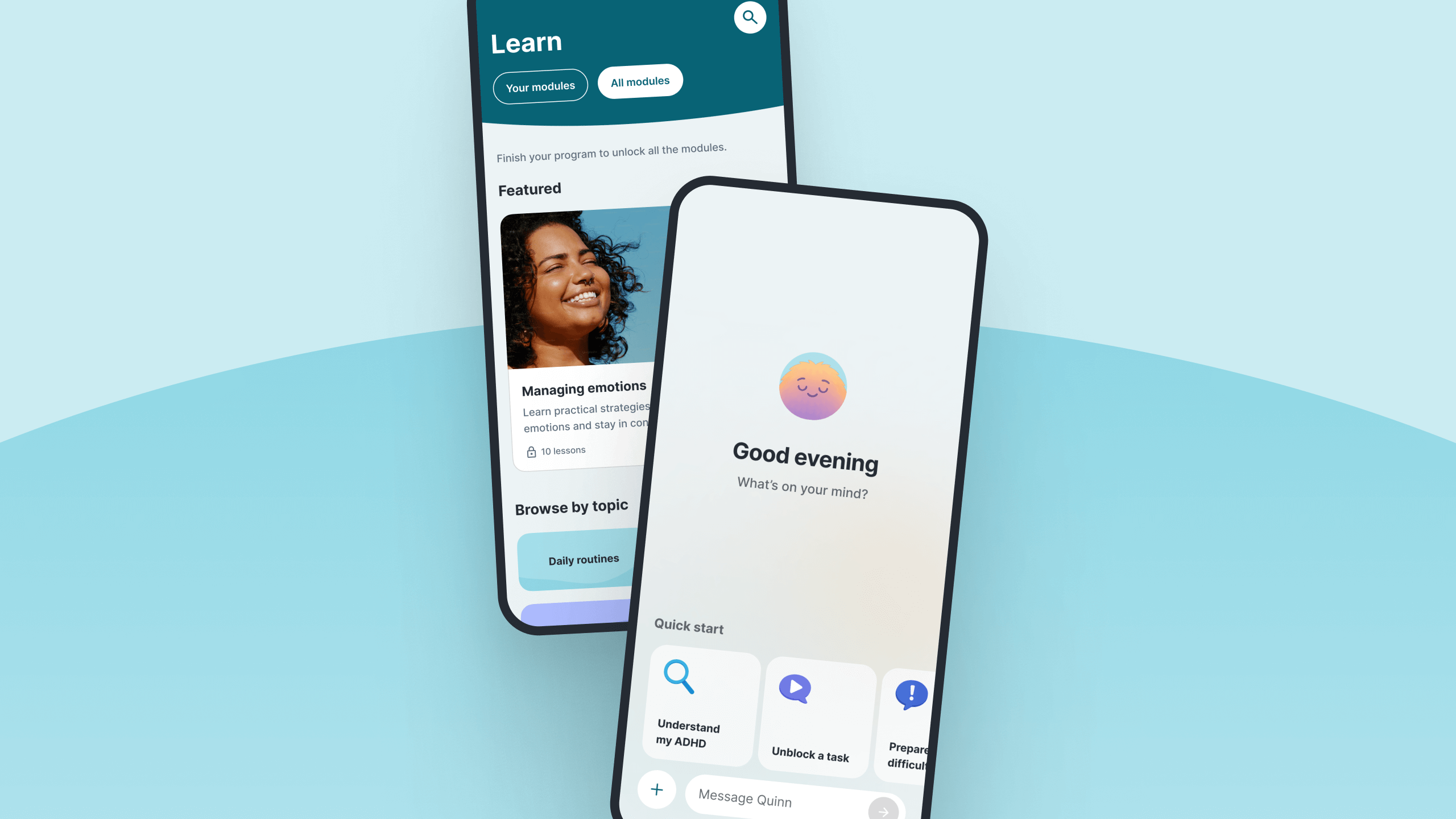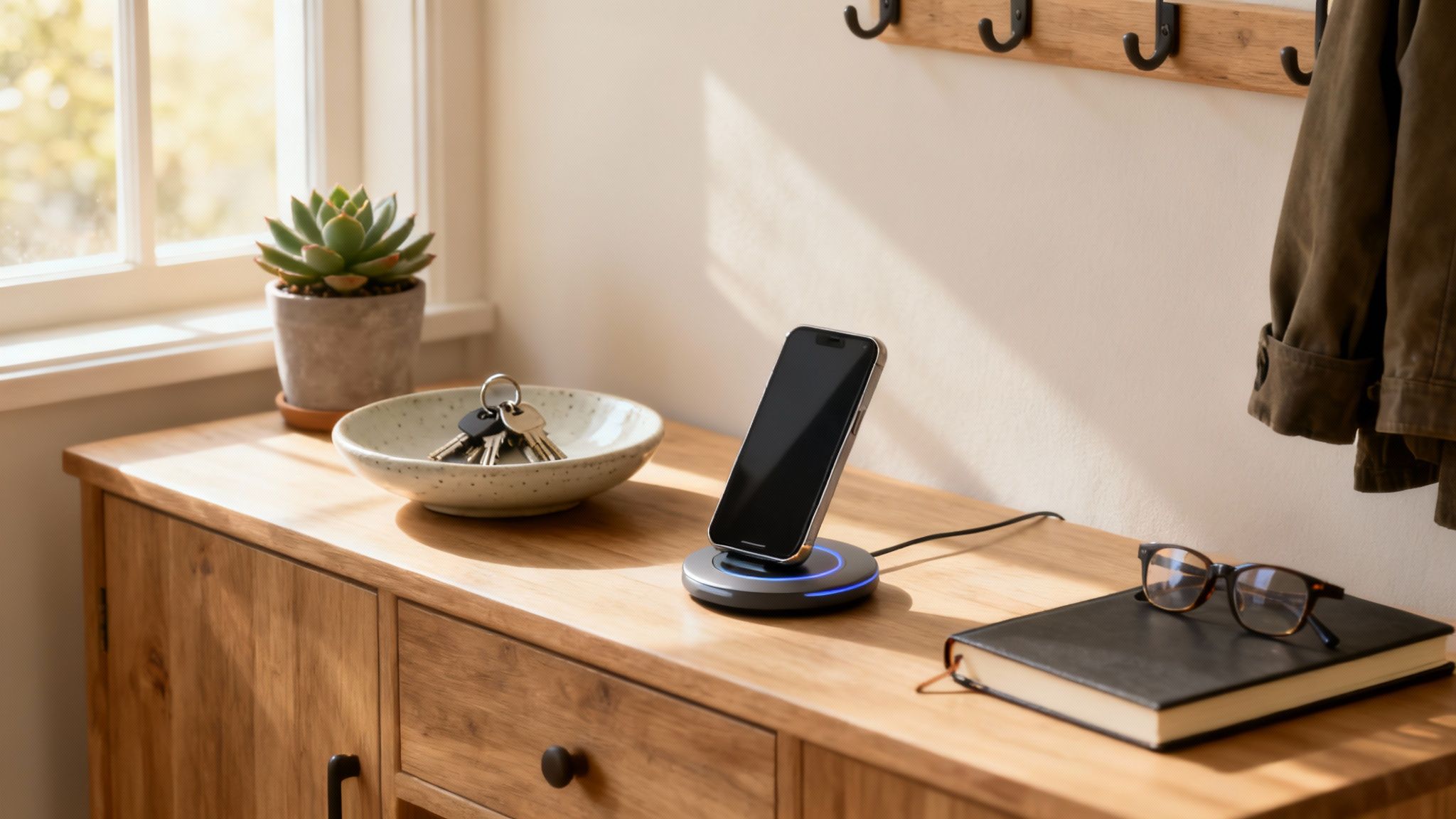I have a tendency to be exceedingly hard on myself. This is especially true when I find mistakes in my work after submitting a project or assignment. Anxiety is like an uninvited coworker: stressing me out with constant demand for re-reads and revisions, all in the interest of avoiding even one single tyop.
(yes, that was supposed to be a joke)
Getting lost in perfection
I’ve worked as a photographer, video editor, and copywriter, among other employment traps for my attention to detail. Expecting perfection of ourselves is often a self-defeating and troublesome ADHD habit.
In some ways, it can be an asset (and liability) for us all—in creative work, data entry, research projects, and even kitchen remodels. Not to contradict myself already or anything, but I think I have a perfect analogy for this. Random pop culture references help me understand these concepts, so bear with me! (Did I mention I have ADHD?)
Take Alanis Morissette’s 1996 single Ironic, a song that famously misuses the word “irony” in its lyrical content. Having “ten thousand spoons when all you need is a knife” is bewildering, poor planning, and maybe even cause for a trip to Target. But it is not ironic.
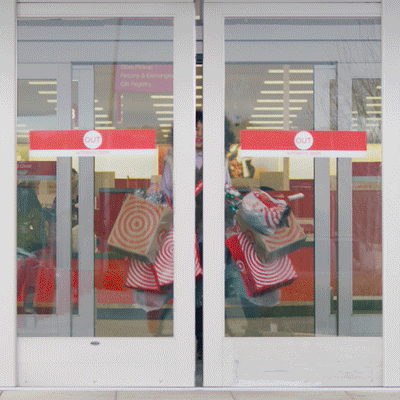
Alanis and her co-writer, Glen Ballard (who has an English degree, no less), weren’t particularly vigilant about the use of "irony" in the songwriting process. Ironic almost didn’t make the album’s final track list. In fact, Alanis and Glen thought nobody would end up hearing the song anyway. Now it’s a famous staple of 90s music and helped make Jagged Little Pill one of the best-selling albums of all time.
One lyrical imperfection after another, this song helped to define Alanis’ career. I have no doubt Alanis would've been successful without it, but if she had let perfectionism get in the way, we wouldn’t have Ironic as we know it today.
ADHD and perfectionism
For me, the idea of "perfectionism" implies an ability to focus on something long enough to make it flawless. This kinda works for ADHDers when we're in a state of hyperfocus but not when we’re having trouble getting our productive momentum going. The stereotype of people with ADHD is that we can’t get anything done or even started. This leads us to the Million Dollar Question: Is it even possible to be a perfectionist with ADHD?

Nope. It's not. Take it from me — I’ve been trying for years.
For ADHDers, perfectionism can be a coping mechanism for Imposter Syndrome. It’s yet another example of our all-or-nothing mentality. Making matters worse when we can't even get started, perfection can also explain our task avoidance and procrastination. Our real or perceived shortcomings can also make us overcompensate, attempting to seek perfection in the other direction. Consider this:
Have you ever stayed up late to put every possible finishing touch on a college paper only to realize it’s past the midnight deadline to upload it? Perfectionism can mess us up even when we’d otherwise turn work in according to schedule. “It might contain a formatting error,” we tell ourselves, not acknowledging that any errors will almost certainly go unnoticed by others anyway. Perfection is our attempt to manage our anxieties. It's an attempt to exceed in spite of others’ low expectations and those we project on ourselves. This is when we experience unhelpful emotions more intensely.
It's why we fear rejection and criticism.
Track #3 of Jagged Little Pill (yes, I’m still on this) is titled… get this... “Perfect.” It's a vignette of societal expectations and their negative repercussions. To that effect, Alanis explained:
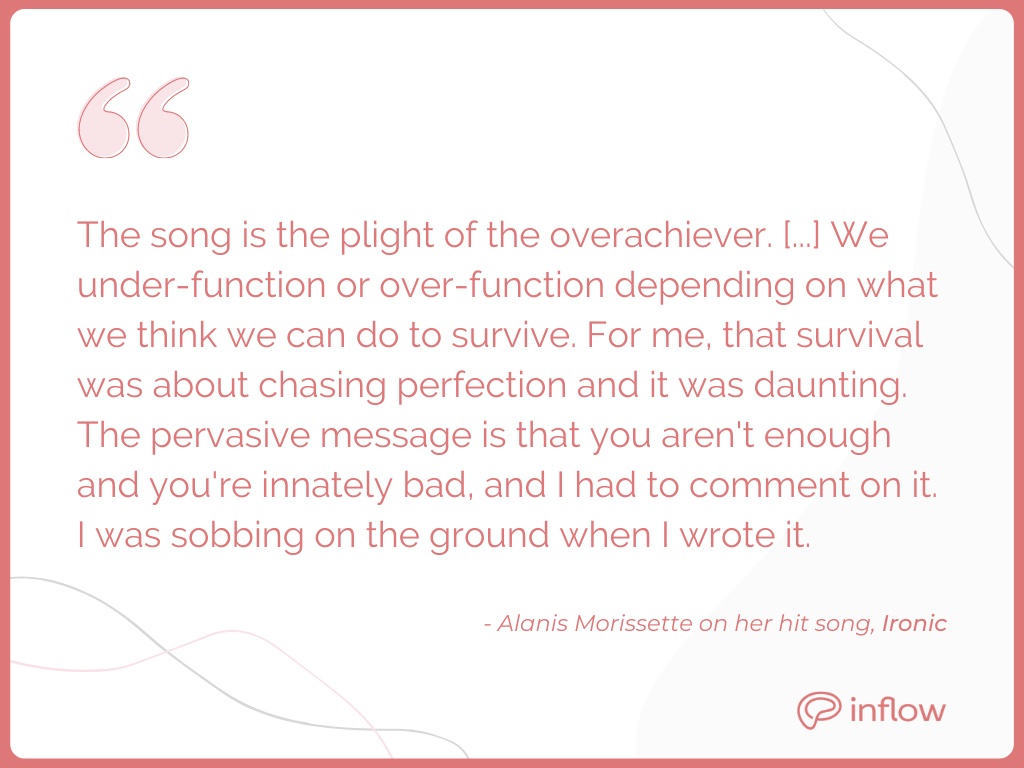
Chasing perfection is exhausting, and we often hurt our own feelings in the process. Let’s explore some ways to be our own, more sympathetic character.
How to overcome perfectionism
1. Set realistic expectations
When we push ourselves to overachieve and over-function just to prove others wrong, we can end up becoming perfectionists in the process.
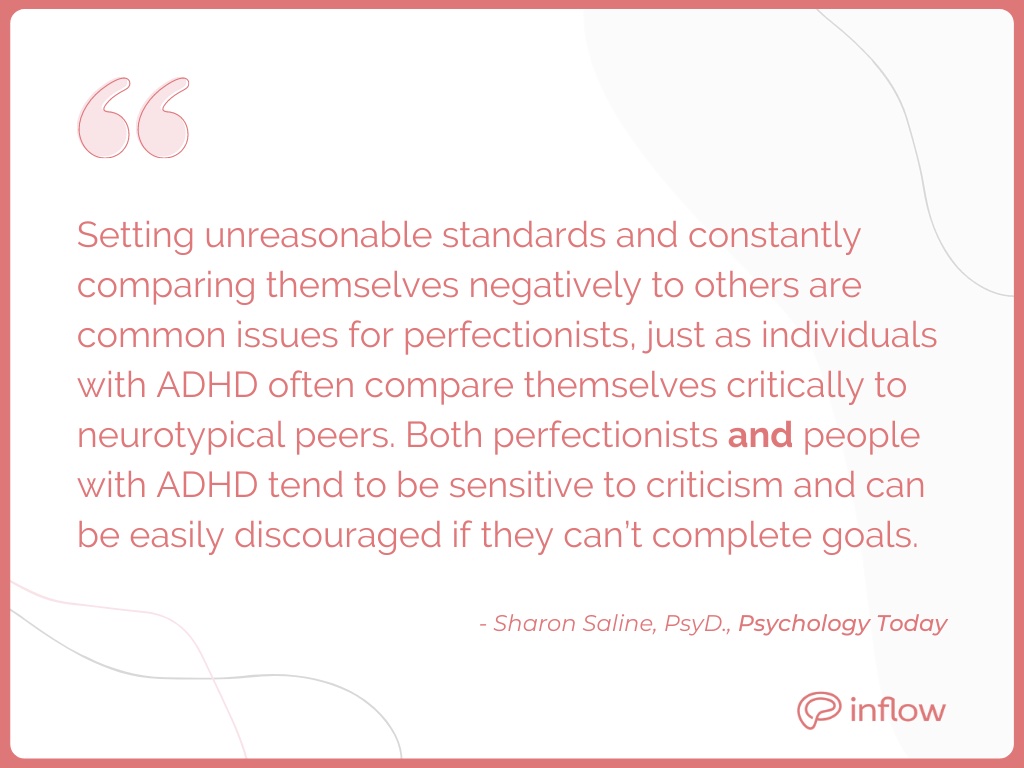
It's a much better practice to set reasonable goals and deadlines for ourselves. Consider the existing external sources of pressure we already face! This isn’t to say that you can’t work hard and have high expectations. We can instead be nicer to ourselves by setting reasonable and attainable goals and expectations.
2. Progress over perfection
Without imperfection, we wouldn't learn and grow. If we're always aiming for perfection, we'll never understand the value of making mistakes or experience the wonders of growth and self-improvement. Instead, we can try to aim for:
- Beating our own high scores
- Satisfaction in a job well done
- Simply meeting expectations (rather than exceeding them)
- Personal development
Try to focus on making progress in the process rather than perfection out of rejection. Progress over Perfection.
3. Practice mindfulness
This is a great opportunity to re-frame those unhelpful and negative feelings. Recognize and acknowledge your sensitivity in these self-critical moments. How intensely we feel, our passion, and how tuned-in we are to the emotions of ourselves and others - these are the things that make us unique. Try to meet your observations with compassion, not resentment. Speak to your opportunities with “could” and not “should.” When “I’m not good enough; everyone thinks I’m a failure,” comes to mind, ask yourself: Is it true?
Your feelings are real, but are they true? What would life be like without these thoughts? Would you still lose sleep over work if you believed your boss thought that you’re actually really smart, and not that you suck? When you receive feedback, is it constructive and delivered with care? Consider the messenger. Is this someone invested in your growth, who otherwise celebrates your accomplishments?
One way to investigate these feelings is through meditation. Try a guided meditation focused on self-compassion, acceptance, reinforcing a positive self-image. Guided meditations can be found on apps like Calm or Headspace. You can also try these mindfulness reflections with journaling and daily affirmations. Apps such as Inflow offer learning modules on Mindfulness and come with journaling prompts and challenges related to the modules.
Final thoughts: life has a funny, funny way of helping us out
If you’re like me, you’ve poured your energy and creativity into dozens of Passion Projects only to shrug off compliments from others or give up on the projects entirely because they "aren't good enough". Downplaying our efforts and getting lost in perfection is a good way to hurt our own feelings. Why do we allow ourselves to narrate life with unhelpful self-talk? We do this even when presented with plenty of reasons to believe otherwise.
Make it make sense!
It just so happens that this particular topic is like remembering to take your meds when their whole point is to help you concentrate. How's that one go, again?
Ironic ADHD
Like rememberiiing
To take your meds todayWhen their whole pooiiint
Is to help you concentrate
It’s the impuuuulse
To start a new hobby
And now I'm stuck scrolling
Through Twitterrrrrr
... And isn’t it ironic?
Don’t you think ...?
Though, hopefully... this article has given some good advice that you just do take.
P.S. We took the liberty of linking the song that's probably stuck in your head at this point... you know - in case you were going to head there next, anyway. :)

.png)
